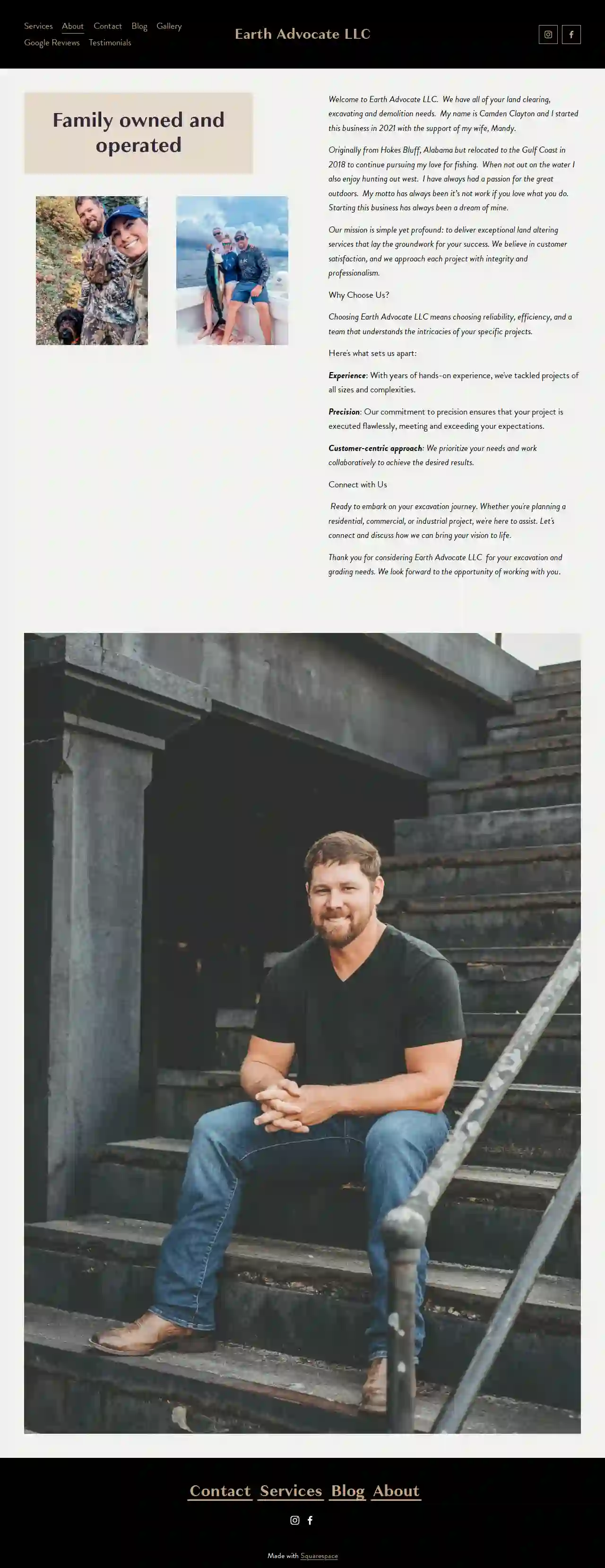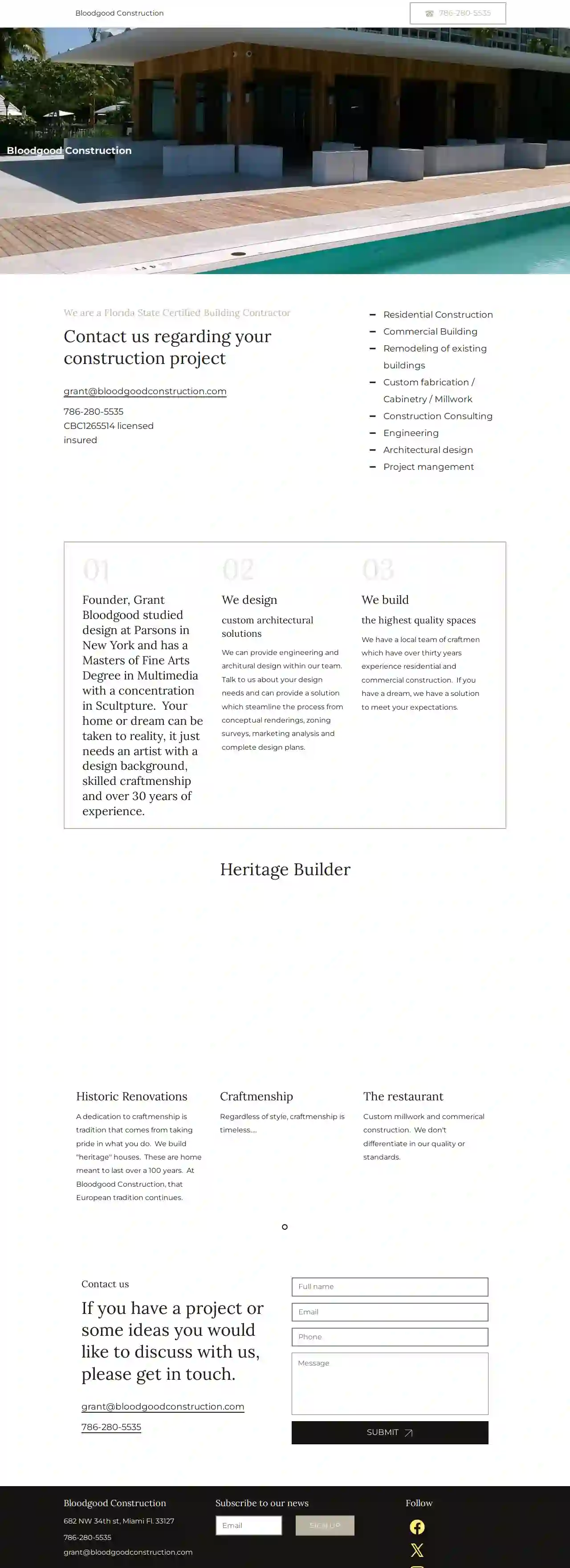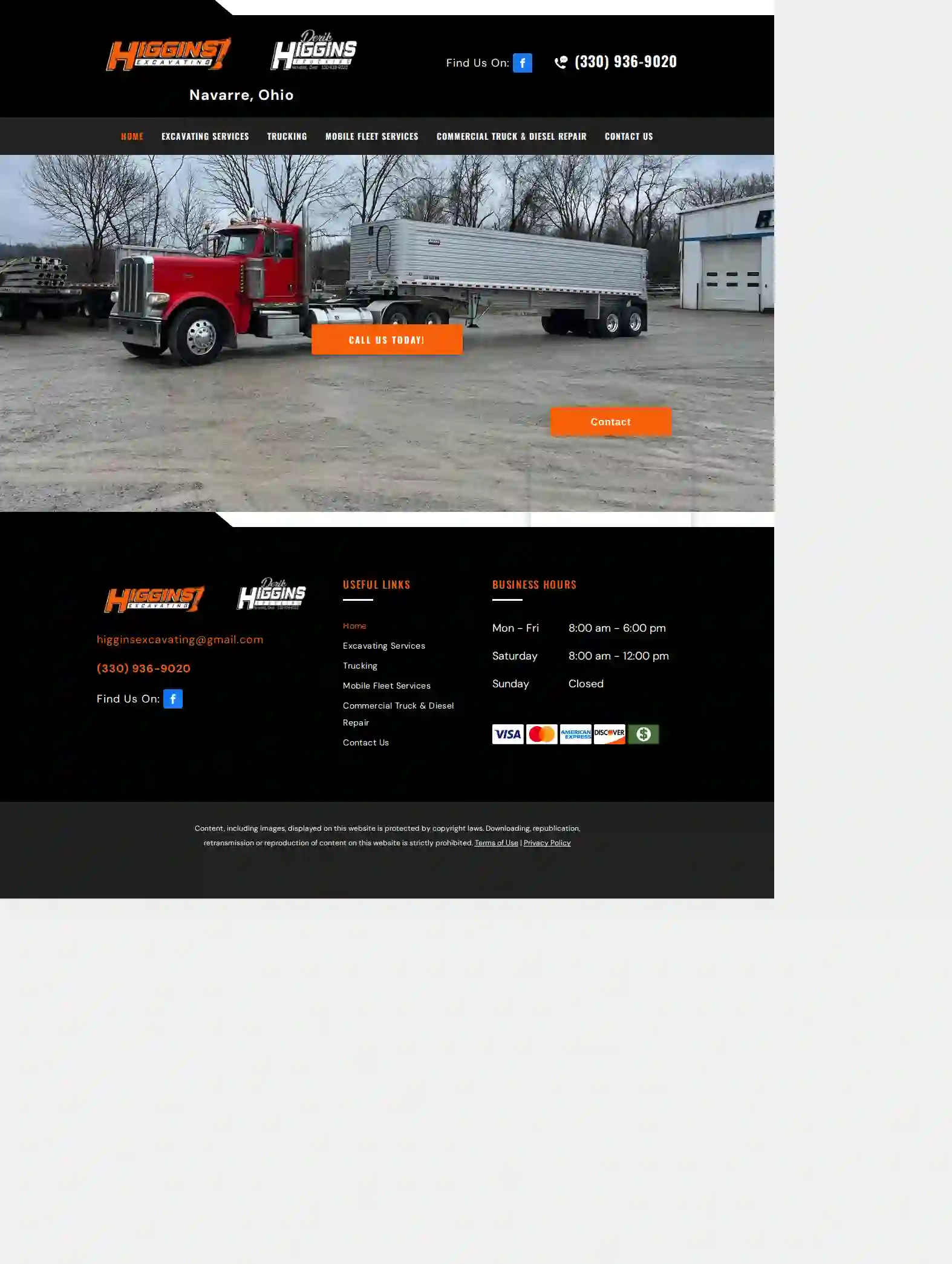Demolition Contractors Gulfport
Find top Demolition Contractors in Gulfport
Get 3 FREE Demolition Company Near Me quotes for your project today! Compare profiles, reviews, accreditations, portfolio, etc... and choose the best deal.

Reefchoice Rockworks
512 reviews24763 Southwest 177th Avenue, Homestead, 33031, USWaterfalls Ponds Excavation Bobcat and Backhoe Services!!! We offer full of construction and AG equipment services. Custom Ponds Waterfalls and Rockwalls We can design and build any size waterfeature! We offer Rockwalls, waterfalls, koi ponds, pond less waterfalls, landscaping rocks slabs and anything you can imagine! South Florida’s BUSHHOG EXPERTS! We offer Bush hog services throughout south Florida! The only full time Bush Hog, Brush Cutting and Mulcher Service in south Florida with over 20 years experience!let our team save you time and money with our fast and reliable service satisfaction guaranteed!
- Services
- Why Us?
- Gallery
Get Quote
Shenandoah General Construction LLC
4.513 reviewsPort St. Lucie, USProtecting Infrastructure Shenandoah is an infrastructure inspection, restoration, and maintenance company committed to helping our customers develop and manage their maintenance programs. Problem Solving Culture We help our customers rework their infrastructure maintenance program from the ground up. The result is a maintenance program that helps stretch every dollar and operates at the highest optimal level. IRM Program Our Inspection, Restoration, and Maintenance (IRM) Program has helped maximize the performance of our customers sanitary and stormwater systems for over 45 years. LEARN ABOUT OUR IRM PROGRAM
- Services
- Why Us?
- Testimonials
- Gallery
Get Quote
Discount Air LLC
4.844 reviews1130 E Donegan Ave., Kissimmee, 34744, USWe Do it Right The first Time At Discount Air LLC HVAC & Plumbing, we pride ourselves on being the premier HVAC contractor in Central Florida, offering a comprehensive approach to contracting and specializing in a wide range of services. With our expertise and attention to detail, we handle all the small details, leaving you free to focus on what matters most. From installation and maintenance to repairs and replacements, we have the knowledge and experience to meet all your HVAC needs. Our team of skilled technicians is well-versed in the latest industry practices and technologies, ensuring that we deliver top-notch results every time. Whether you need a new air conditioning system, ductwork installation, or indoor air quality solutions, we've got you covered. We understand that each client has a unique vision for their HVAC project. That's why we take the time to listen to your needs and preferences, customizing our services to align with your goals. Our dedicated team will work closely with you, offering expert advice and guidance throughout the process. We believe in clear and transparent communication, so you'll always be kept informed about the progress of your project. When you choose us as your HVAC contractor, you can expect professionalism, reliability, and exceptional customer service. We handle the mundane bureaucratic tasks and coordinate various contracting initiatives, ensuring a seamless and stress-free experience for you. Don't wait any longer to bring your HVAC vision to life! Contact Discount Air LLC today to discuss your project with our experts. Let us take care of the details while you enjoy the comfort and efficiency of a perfectly functioning HVAC system. Together, we'll create an environment that exceeds your expectations!
- Services
- Why Us?
- Gallery
Get Quote
Earth advocate LLC.
534 reviewsPensacola, USWelcome to Earth Advocate LLC We are a family owned and operated business that provides land clearing, excavating, and demolition services. I'm Camden Clayton, and I started this business in 2021 with the support of my wife, Mandy. Originally from Hokes Bluff, Alabama, we relocated to the Gulf Coast in 2018 to continue pursuing my love for fishing. When not out on the water, I also enjoy hunting out west. I have always had a passion for the great outdoors. My motto has always been it’s not work if you love what you do. Starting this business has always been a dream of mine. Our mission is simple yet profound: to deliver exceptional land altering services that lay the groundwork for your success. We believe in customer satisfaction, and we approach each project with integrity and professionalism. Why Choose Us? Choosing Earth Advocate LLC means choosing reliability, efficiency, and a team that understands the intricacies of your specific projects. Here's what sets us apart: Experience: With years of hands-on experience, we've tackled projects of all sizes and complexities. Precision: Our commitment to precision ensures that your project is executed flawlessly, meeting and exceeding your expectations. Customer-centric approach: We prioritize your needs and work collaboratively to achieve the desired results. Connect with Us Ready to embark on your excavation journey? Whether you're planning a residential, commercial, or industrial project, we're here to assist. Let's connect and discuss how we can bring your vision to life. Thank you for considering Earth Advocate LLC for your excavation and grading needs. We look forward to the opportunity of working with you.
- Services
- Why Us?
- Our Team
- Gallery
Get Quote
Bloodgood Construction
51 reviews682 NW 34th st, Miami, 33127, USBloodgood Construction We are a Florida State Certified Building Contractor. Contact us regarding your construction project. Services Offered Residential Construction Commercial Building Remodeling of existing buildings Custom fabrication / Cabinetry / Millwork Construction Consulting Engineering Architectural design Project management About Us Grant Bloodgood, the founder, studied design at Parsons in New York and holds a Masters of Fine Arts Degree in Multimedia with a concentration in Sculpture. With over 30 years of experience, he brings his artistic vision and skilled craftsmanship to every project, transforming your home or dream into a reality. Our Approach We design custom architectural solutions, providing engineering and architectural design services within our team. We understand your design needs and offer solutions that streamline the process from conceptual renderings, zoning surveys, marketing analysis, and complete design plans. Quality Construction We have a local team of skilled craftsmen with over thirty years of experience in residential and commercial construction. We are committed to building the highest quality spaces, exceeding your expectations and bringing your dreams to life. Heritage Builder Our dedication to craftsmanship is a tradition rooted in taking pride in our work. We build "heritage" houses, homes designed to last over a century. At Bloodgood Construction, this European tradition continues. Craftmanship Regardless of style, craftsmanship is timeless. We apply the same high standards and quality to all our projects, whether it's a residential home or a commercial space. The Restaurant We specialize in custom millwork and commercial construction. Our commitment to quality and standards remains unwavering across all our projects.
- Services
- Why Us?
Get Quote
White’s Land Maintenance
511 reviewsPensacola, USAbout Us White's Land Maintenance is a full-service land clearing company serving Milton, FL and surrounding areas. We specialize in Forestry Mulching, land clearing, debris removal, tree trimming/removal, excavating, and grading services for residential and commercial properties. With our experience we can handle any job from small to large. We are committed to providing quality service with a friendly touch that will leave you with the perfect outdoor space you desire! What we are best at We offer a wide range of services to meet your land clearing and maintenance needs. Whether you need to clear a large tract of land, remove unwanted vegetation, or simply trim your trees, we have the experience and expertise to get the job done right.
- Services
- Why Us?
- Testimonials
- Gallery
Get Quote
All American Land Clearing & Tractor Services
4.820 reviewsPort Saint Lucie, USAbout Us Welcome to All American Land Clearing & Tractor Services, your premier destination for all your land clearing and tractor service needs. Based in the heart of the Treasure Coast, we proudly serve the areas spanning from Palm Bay, FL to West Palm Beach. With a strong commitment to excellence, our company is founded on the principles of customer satisfaction and affordability. Backed by extensive experience and knowledge, we deliver the highest quality service to our valued clients. No job is too big or too small – we consistently strive for greatness in every project we undertake. At All American, we prioritize a one-on-one approach with our clients, ensuring the highest quality and satisfaction at every step. Our expertise encompasses a range of services, including land clearing, earthwork, bobcat and tractor service, milling, finish grading, and more. We are also well-equipped to handle pine tree stump removal, providing comprehensive solutions for all your land enhancement needs. Experience excavation excellence with our skilled team and advanced machinery. We take pride in transforming properties and optimizing land potential through meticulous attention to detail and precision. Choose All American Land Clearing & Tractor Services for professional, reliable, and top-notch solutions that exceed expectations. Contact us today to discuss your project requirements and let us help you bring your vision to life. Take the Next Step with All American Land Clearing and Tractor Services Contact us today and let's discuss your project requirements and find the perfect solution for you.
- Services
- Why Us?
- Gallery
Get Quote
GSGC Construction LLC
Orlando, USWelcome to GSGC Construction LLC We are a professional construction company offering a wide range of residential and commercial construction services. Our team is dedicated to delivering high-quality projects on time and within budget. Experienced and Efficient With years of experience in the industry, GSGC Construction LLC is committed to delivering high-quality construction projects on time and within budget. We are a team of skilled professionals who are passionate about our work and committed to exceeding our clients' expectations. Our Services We offer a wide range of construction services, including: Roofing: Residential or Commercial Flat, Gables End or Hip Roof of any size. Turn key construction from design to finish construction. Remodeling Residential or Commercial projects of any size. Design Built: accommodating the construction design during construction to meet the owner's expectations. Commercial Building: Shell Construction, Offices Building, Medical Clinic, Retail Store and other structures. Residential Homes of any size. Spec Homes: Fast construction to accommodate investor's needs. Our Commitment We are committed to providing our clients with the highest level of service and quality. We believe in building strong relationships with our clients and working closely with them to ensure that their projects are completed to their satisfaction. Contact Us Today We would be happy to discuss your project with you. Please contact us today to schedule a consultation.
- Services
- Why Us?
- Gallery
Get Quote
Cloud 9 Services, LLC
Tampa, USUnderground Utilities Experts INDUSTRIAL & COMMERCIAL PLUMBING IN TAMPA At Cloud 9 Services, LLC we are the leading plumbing and underground utility company for the Tampa area and have been expertly servicing our clients for over 20 years. We are open 24 hours a day 7 days a week, making us the go-to business for any service or emergency you have day or night. If you have been looking for a company that is efficient, reliable and accessible, you can't go wrong with us at Cloud 9 Services, LLC. Our licensed and certified contractors are ready to take on any project you may have and we look forward to working with you on your future projects. Listed below are some of the services we offer for our commercial and industrial clients. For more information don't hesitate to contact our expert staff, 866-325-6839, they are here to answer any and all questions you may have.
- Services
- Why Us?
- Gallery
Get Quote
Higgins Excavating LTD
4.913 reviewsNavarre, USAbout Higgins Excavating Higgins Excavating is a family-owned and operated business serving the Navarre, Ohio area. We are committed to providing our customers with the highest quality excavating services at the most affordable rates. Our team is experienced and knowledgeable, and we are always ready to go the extra mile to ensure your satisfaction. We offer a wide range of excavating services, including: Site preparation Grading Drainage Utility installation And more! We also offer trucking and mobile fleet services. Our fleet of trucks is available for hauling a variety of materials, and our mobile fleet services can keep your equipment running smoothly. We are committed to providing our customers with the best possible service. We are always available to answer your questions and provide you with a free estimate. Contact us today to learn more about our services.
- Services
- Why Us?
- Gallery
Get Quote
Over 22,076+ Excavation Businesses in our network
Our excavation experts operate in Gulfport and surroundings!
ExcavationHQ has curated and vetted the Best Excavation Contractors arround Gulfport. Find a top & reliable contractor today.
Frequently Asked Questions About Demolition Contractors
- 'Can I see proof of your licensing and insurance?' Verify their credentials and coverage.
- 'What experience do you have with projects like mine?' Ensure they have relevant expertise.
- 'Can you provide references from past clients?' Check their reputation and customer satisfaction.
- 'What are your safety protocols?' Prioritize contractors who emphasize safety.
- 'How will you handle hazardous materials?' Ensure they have proper procedures for asbestos or lead abatement.
- 'What is your timeline for completing the project?' Understand the project duration.
- 'How will you manage noise, dust, and debris?' Discuss mitigation measures for minimizing disruption.
- 'What are your payment terms?' Clarify payment schedules and any required deposits.
- Dust Suppression: Use water spraying, misting systems, or other dust suppression techniques to control airborne particles.
- Noise Barriers: Erect temporary noise barriers around the demolition site to reduce noise transmission to nearby properties.
- Work Schedule: Schedule noisy demolition activities during permitted hours to minimize disturbance to neighbors.
- Communication: Keep neighbors informed about the demolition schedule and any potential disruptions.
How can I tell if my building contains asbestos?
What is a demolition bond?
What questions should I ask a demolition contractor before hiring them?
How can I minimize the dust and noise from demolition?
How can I tell if my building contains asbestos?
What is a demolition bond?
What questions should I ask a demolition contractor before hiring them?
- 'Can I see proof of your licensing and insurance?' Verify their credentials and coverage.
- 'What experience do you have with projects like mine?' Ensure they have relevant expertise.
- 'Can you provide references from past clients?' Check their reputation and customer satisfaction.
- 'What are your safety protocols?' Prioritize contractors who emphasize safety.
- 'How will you handle hazardous materials?' Ensure they have proper procedures for asbestos or lead abatement.
- 'What is your timeline for completing the project?' Understand the project duration.
- 'How will you manage noise, dust, and debris?' Discuss mitigation measures for minimizing disruption.
- 'What are your payment terms?' Clarify payment schedules and any required deposits.
How can I minimize the dust and noise from demolition?
- Dust Suppression: Use water spraying, misting systems, or other dust suppression techniques to control airborne particles.
- Noise Barriers: Erect temporary noise barriers around the demolition site to reduce noise transmission to nearby properties.
- Work Schedule: Schedule noisy demolition activities during permitted hours to minimize disturbance to neighbors.
- Communication: Keep neighbors informed about the demolition schedule and any potential disruptions.